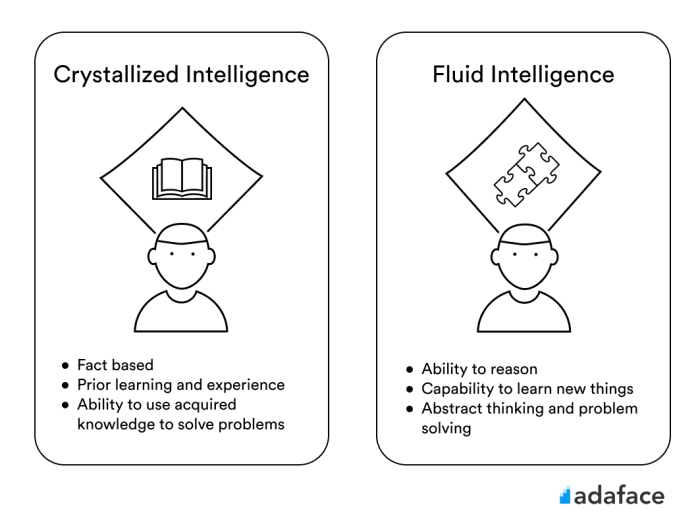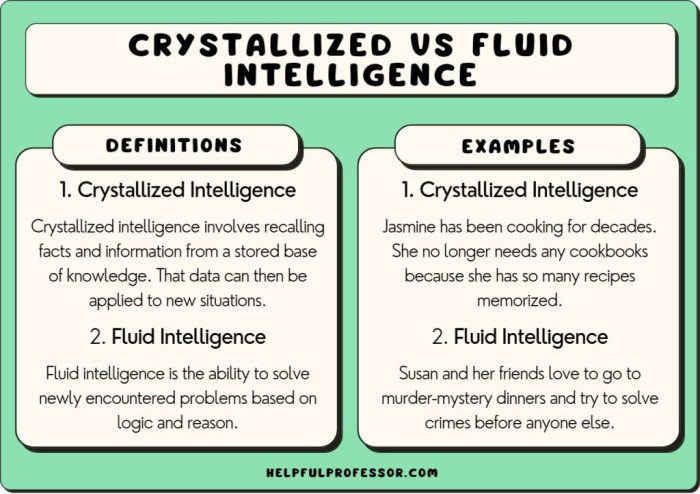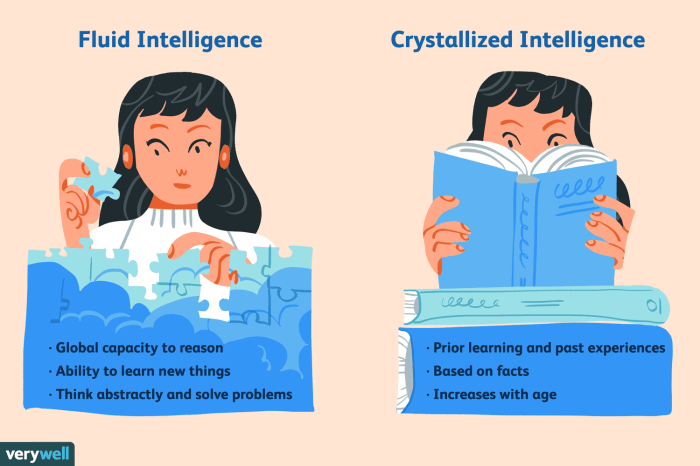Inteligencia cristalizada y fluida ejemplos – Embark on an intellectual journey with ‘Fluid and Crystallized Intelligence: Examples and Applications.’ Dive into the captivating realm of human cognition as we explore the distinct characteristics, differences, and practical applications of these two fundamental types of intelligence. From solving complex puzzles to navigating social interactions, discover how fluid and crystallized intelligence shape our daily lives.
Unveiling the intricate tapestry of human intelligence, this discourse delves into the nature of crystallized intelligence, its knowledge-based foundation, and its unwavering stability over time. Conversely, fluid intelligence emerges as the agile and adaptable force behind our reasoning, problem-solving, and abstract thinking abilities.
Definition of Fluid and Crystallized Intelligence

Intelligence encompasses a complex set of cognitive abilities that allow individuals to interact effectively with their environment. Among the various models of intelligence, the distinction between fluid and crystallized intelligence is a fundamental one.
Crystallized Intelligence, Inteligencia cristalizada y fluida ejemplos
Crystallized intelligence refers to the accumulation of knowledge and skills that are acquired through education and experience. It is often associated with verbal comprehension, reading, vocabulary, and general knowledge. Crystallized intelligence is relatively stable throughout adulthood and tends to increase with age as individuals continue to learn and accumulate new information.
Fluid Intelligence
Fluid intelligence, on the other hand, represents the ability to reason abstractly, solve problems, and adapt to new situations. It is less dependent on acquired knowledge and more closely associated with cognitive processes such as working memory, attention, and processing speed.
Fluid intelligence typically peaks in early adulthood and gradually declines with age.
Differences between Fluid and Crystallized Intelligence
The key differences between fluid and crystallized intelligence lie in their nature, development, and measurement.
Nature
- Crystallized intelligence is based on acquired knowledge and skills, while fluid intelligence is based on cognitive abilities.
- Crystallized intelligence is more heavily influenced by culture and education, while fluid intelligence is more genetically determined.
Development
- Crystallized intelligence continues to develop throughout life as individuals acquire new knowledge and skills.
- Fluid intelligence peaks in early adulthood and gradually declines with age.
Measurement
- Crystallized intelligence is typically measured through tests of vocabulary, reading comprehension, and general knowledge.
- Fluid intelligence is measured through tests of problem-solving, reasoning, and working memory.
Applications of Fluid and Crystallized Intelligence

Both fluid and crystallized intelligence play important roles in various aspects of life.
Crystallized Intelligence, Inteligencia cristalizada y fluida ejemplos
- Academic success
- Job performance in knowledge-based fields
- Effective communication
- Decision-making based on accumulated knowledge
Fluid Intelligence
- Problem-solving and critical thinking
- Adapting to new situations
- Learning new skills
- Reasoning and logical thinking
Enhancing Fluid and Crystallized Intelligence: Inteligencia Cristalizada Y Fluida Ejemplos
While intelligence is largely influenced by genetic factors, there are ways to enhance both fluid and crystallized intelligence.
Fluid Intelligence
- Engage in mentally stimulating activities such as puzzles, games, and reading.
- Practice working memory exercises.
- Challenge yourself with new tasks and situations.
Crystallized Intelligence, Inteligencia cristalizada y fluida ejemplos
- Continue learning throughout life.
- Read widely and engage in discussions.
- Seek out new experiences and challenges.
Real-World Examples of Fluid and Crystallized Intelligence

| Situation | Required Intelligence Type | Explanation | Example |
|---|---|---|---|
| Solving a complex math problem | Fluid Intelligence | Requires abstract reasoning and problem-solving abilities | Solving a Sudoku puzzle |
| Writing a research paper | Crystallized Intelligence | Requires knowledge of the subject matter and writing skills | Writing a paper on the history of psychology |
| Adapting to a new job | Fluid Intelligence | Requires the ability to learn new tasks and adapt to changing demands | Learning a new software program |
| Giving a presentation | Crystallized Intelligence | Requires knowledge of the topic and communication skills | Giving a presentation on climate change |
Query Resolution
What are the key differences between fluid and crystallized intelligence?
Fluid intelligence is characterized by its flexibility and adaptability, enabling us to reason, solve problems, and think abstractly. In contrast, crystallized intelligence represents our accumulated knowledge and expertise, which remains relatively stable over time.
How are fluid and crystallized intelligence measured?
Fluid intelligence is typically assessed through tests that measure reasoning, problem-solving, and abstract thinking abilities. Crystallized intelligence, on the other hand, is evaluated using tests that assess knowledge and vocabulary.
How do fluid and crystallized intelligence develop and change over time?
Fluid intelligence tends to peak in early adulthood and gradually declines with age. Crystallized intelligence, however, continues to grow throughout our lives as we acquire new knowledge and experiences.